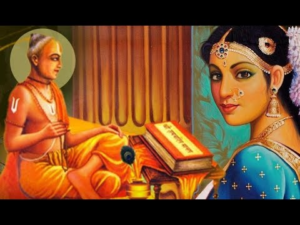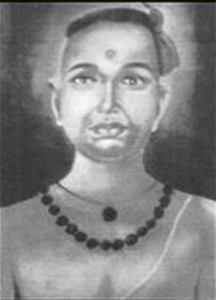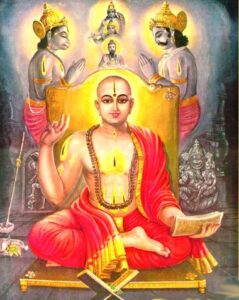Introduction
Vidyapati (1352 – 1448), also known as Maithil Kavi Kokil (the poet cuckoo of Maithili), was a renowned Maithili poet and Sanskrit writer. Born in the village of Bisfi in the Madhubani district of the Mithila Region of India and Nepal, he was the son of Ganapati. Vidyapati’s name is derived from two Sanskrit words, Vidya (knowledge) and Pati (master), signifying a man of knowledge.
Influence and Contributions
Vidyapati’s poetry significantly influenced Hindustani, Bengali, and other Eastern literary traditions for centuries. At the time of Vidyapati, the prakrit-derived late abahatta language was transitioning into early versions of Eastern languages such as Maithili, Bengali, and Oriya. Vidyapati’s influence in shaping these languages has been compared to the impact of Dante in Italy and Chaucer in England.
Vidyapati is known for his love lyrics and poetry dedicated to Shiva. His language closely resembles Maithili, spoken around Mithila (north Bihar and the Janakpur region in Nepal), and is related to the abahattha form of early Bengali.
Love Songs and Devotional Poetry
Vidyapati’s love songs, depicting the sensuous love story of Radha and Krishna, follow a tradition of Vaishnav love poetry popular in Eastern India. This tradition uses the language of physical love to describe spiritual love, reflecting a key turn in Hinduism initiated by Ramanuja in the 11th century. This movement empowered individuals to realize God directly through love, bypassing the need for priests. Part of this transformation included a shift to local languages instead of formal Sanskrit.
The songs he wrote as prayers to Lord Shiva are still sung in Mithila, forming a rich tradition of sweet and lovely folk songs.
The Story of Ugna
According to folklore, Vidyapati’s devotion to Shiva was so great that the Lord decided to come and live in his house as a servant named Ugna. Ugna imposed a condition that Vidyapati could not reveal his identity, or he would leave. One day, Vidyapati’s wife, angry at Ugna, started to beat him. Unable to tolerate this, Vidyapati revealed Ugna’s true identity as Shiva, leading to Ugna’s disappearance. This story highlights Vidyapati’s deep devotion and Shiva’s divine presence in his life.
Ugna’s Miracles
Ugna stayed with Vidyapati for many years, helping him in various situations. For instance, when Shivasimha, the king of Mithila, was arrested by Emperor Allaudin Khilji of Delhi, Vidyapati, accompanied by Ugna, traveled to Delhi to secure his release. Vidyapati, with Ugna’s blessings, defeated the Sultan’s poet in a scholarly debate and overcame many obstacles to free the king.
The Departure of Ugna
One day, Vidyapati’s wife assigned a task to Ugna, which he failed to complete. She became angry and started beating him. Vidyapati, unable to see Shiva being humiliated, revealed Ugna’s true identity. At that moment, Ugna disappeared. Vidyapati searched for Ugna through temples, rivers, and jungles until he found him in Nandanvana. Shiva told Vidyapati that he would not return to his house but would help him whenever needed. The place where Ugna appeared is known as Ugnaasthan, where a small lingam has been enshrined and worshipped by local devotees.
Vidyapati’s Influence in Oriya Literature
Vidyapati’s influence extended to Orissa through Bengal. The earliest composition in Brajabuli is ascribed to Ramananda Raya, the governor of the Godavari province of the King of Orissa, Gajapati Prataprudra Dev. He was a disciple of Chaitanya Mahaprabhu and recited his Brajabuli poems to him on the banks of the Godavari River in 1511-12. Other notable Oriya poets influenced by Vidyapati’s poems include Champati Ray and King Pratap Malla Dev (1504–32).
Lessons to Be Learned
- Unwavering Faith: Vidyapati’s unwavering faith in Lord Shiva brought divine intervention into his life.
- Respect and Devotion: The importance of respecting and serving sadhus and recognizing their spiritual stature.
- Divine Assistance: The story demonstrates that God assists His devotees in times of need.
- Power of Bhakti: Vidyapati’s life underscores that sincere devotion can lead to divine blessings and miracles.
Teaching from Srimad Bhagavatam
Srimad Bhagavatam 1.5.18:
tyaktvā sva-dharmaṁ caraṇāmbujaṁ harer
bhajann apakvo ‘tha patet tato yadi
yatra kva vābhadram abhūd amuṣya kiṁ
ko vārtha āpto ‘bhajatāṁ sva-dharmataḥ
“If someone gives up his occupational duties and works in Krishna consciousness and then falls down on account of not completing his work, what loss is there on his part? And what can one gain if one performs his material activities perfectly?”
This verse emphasizes that even an incomplete endeavor in devotional service carries great benefit, as it is never lost.
Teaching from Caitanya Caritamrita
Caitanya Caritamrita, Madhya-lila 22.62:
sadhu-sanga, nama-kirtana, bhagavata-sravana
mathura-vasa, sri-murtira sraddhaya sevana
“One should associate with devotees, chant the holy name of the Lord, hear Srimad Bhagavatam, reside at Mathura, and worship the Deity with faith and veneration.”
This verse highlights the essential practices for spiritual advancement: associating with devotees, chanting the holy name, hearing scriptures, residing in holy places, and worshiping the deity.
Teaching of Srila Prabhupada
Srila Prabhupada emphasized the importance of sincere and humble devotional service.
Srila Prabhupada said: “Devotional service is not a matter of sentimental speculation or imaginative ecstasy. Its substance is practical activity.” (Nectar of Devotion, Chapter 2)
This teaching underscores the importance of practical devotional activities in advancing in Krishna consciousness.
Prayer
O Lord Krishna,
Please grant us the sincerity and devotion of Vidyapati.
Help us to chant Your holy names with faith and love,
So that we may overcome the illusions of material enjoyment and return to Your divine abode.
May our hearts be filled with true devotion and love,
And may we always strive to please You with our actions.
Hare Krishna Hare Krishna Krishna Krishna Hare Hare
Hare Rama Hare Rama Rama Rama Hare Hare
May Your divine grace and blessings be upon us always,
Guiding us towards pure devotion and eternal bliss in Your service.
I humbly request all the devotees to please forward and share these moral and instructive stories so that everyone can benefit by hearing about Krishna and His dear devotees.



